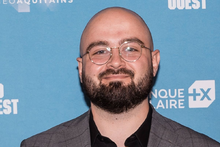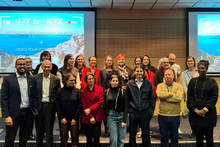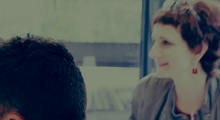2024 is all about you: your successes, your...

Meeting with Fabrice, 17 years with Nestlé and expatriate in Kuala Lumpur
The students of the "KEDGE Alumni Travel" Pro-Act of Asia are currently in Singapore, where they have gone to meet our expatriate Alumni
- CLASS OF: 2001
- POSITION: Procurement Excellence Lead (Asia, Oceania, & Africa)
- COMPANY: NESTLÉ
- LENGTH OF TIME LIVNG ABROAD: 1.5 years in Kuala Lumpur (an expat since 2013)
INTERVIEW :
Please tell us a few words about yourself :
My name is Fabrice Blanc. I’ve worked for Nestlé in Kuala Lumpur for a year now as Procurement Excellence Lead Asia, Oceania, & Africa. I’ve been with Nestlé for more or less 17 years, and have worked for them in different countries, including Switzerland, France, Mexico, Keny, Mauritius Island, and now Malaysia.

Would you tell us about your studies at KEDGE and what they’ve brought to you over the course of your professional career?
I had been trained as an engineer before I took KEDGE’s MAI programme (MSc International Purchasing & Innovation Management). This more technical and scientific training gave me a different perspective of the work environment when I found myself dealing with people with varied work backgrounds (business models, philosophical beliefs, etc...). So the programme made me realise that everyone doesn’t think like an engineer, so they shouldn’t be approached in the same way. My year at KEDGE was very enriching because there was a lot of group work, and it taught me the business side of the company. My dual skills - scientific and business – have not only helped over my professional career, but they still serve me today. They’ve allowed me to more open-minded, to travel, and to work all over for Nestlé.
The programme at London Business School is a Nestlé training programme dedicated to team management and leadership. Taking that training helped me a lot when I took the position at Nespresso because I had learned how to create good group dynamics and how to help each member develop according to his or her qualities and abilities. I also learned soft management skills.

You've been with Nestlé for almost 17 years. What makes you want to stay with them? Is it because you have the opportunity to change continents and environments frequently?
I started working for Nestlé in 2003, so I've been working for the company for 17 years. I've changed jobs every two years on average, which has exposed me to a lot of different things. I’ve also seen a lot of different things, so I've never had the chance to get bored.
In 2013, I had the chance to go live abroad and discover a different environment. I’ve never dreamed about leaving Nestlé because every new job opportunity allowed me to discover new things. Additionally, I consider working abroad to be an opportunity and a challenge - both personally and as a family. In leading such a "nomadic" life, you have to adapt, create, and recreate social and friendship connections. It's not easy, but time and experience helps make the situation better. It’s true that sometimes we’d like to be more stable, but discovering new horizons has brought us so much that it cancels out the negative effect of any instability.
From a professional aspect, working with people with different points of view is very enriching and valuable because you can take the best of what you’ve seen in different places and use them to optimise your way of working. The opportunities that have come up for me to work abroad have usually been proposed to me, and not something I personally chose. I think there is always a chance factor: being in the right place at the right time for your next position.
You've been in Kuala Lumpur for a year and a half. How did your settling down in Asia go?
I was already familiar with Asia because of the many trips I’d made over the last ten years or so, so it wasn't a totally unknown territory. I had had several international positions in which I had the opportunity to work with people based in Asia, so that wasn’t something completely new for me either. However, I had never lived in Asia before. Malaysia is an easy place to live in. Things are well organised and you can find almost everything. My family and I have found it easier to find our bearings here than it was in Africa, where I've also worked.
From a professional point of view, although I work in Malaysia, I don't only work with Malaysians. As my post is a regional one, I also work with people from all over, including Africa and Oceania. Settling in went well because there’s such a big international community with a lot of expatriates.

After having worked on several different continents, do you notice a difference in the ways of working / techniques, between the different countries?
Yes. The ways of working are different, although there are more common points between Africa and Asia than to Europe. One of the main things in Europe is the way of expressing yourself. You can be very direct. You can be believed based on what you say alone, without being seen as blaming the person in front of you. In Africa and Asia, you have to approach things in a different way and address colleagues in a softer manner. This can be sometimes difficult for a French person. Basically, interactions and feedback with employees take more of the form of "soft coaching" than "direct feedback", without losing sight of the final objective, which can be challenging at the beginning.
There are also differences in terms of results and expectations. When I worked in Switzerland and had to communicate steps or results to others, in most of cases it was done and I didn't have to repeat myself several times. Moreover, if it wasn’t done, or was finished late, there would have been a very specific reason. Here and in Africa it's different. You mustn’t hesitate to repeat yourself several times and make sure that things are moving forward. Also, more follow up may be needed depending on the person you are speaking to and the country he or she comes from. In Asia, more follow-up may be needed, but there will be more flexibility and adaptability than there would be in Europe.
Conversely, in Europe, it’s very difficult to change anything because the mindset can be somewhat contradictory and there is often opposition to new ideas. In Europe, barriers to getting started are greater, but once that is overcome, everything will go smoother. In Asia, it depends a lot on the country and the person you are dealing with. Certain are more independent than others. For example, Thailand is one that has a few barriers to entry, but and little in terms of monitoring. At least, that's been the case with my Nestlé teams .
Would you like to stay in Kuala Lumpur or go somewhere else?
It depends on what Nestlé offers me. I think it’ll be somewhere other than Malaysia, even though I would like to stay in Asia, because my partner and I love our new Asian environment.

Do you have any advice for graduates or future graduates who would like to move to Malaysia or Asia?
I think things have changed a lot because you have to be more flexible and open to taking risks when you move abroad. It used to be simpler. You could comfortably leave, knowing you were supported and were guaranteed to return with a pension assured. Nowadays, those cases are the exception. You have to take a personal risk, without any guarantee. There is little chance that a company that sends you abroad will provide you with the same rules and conditions of French employment. If you want to go abroad to work, you have to either do it for a short period of time or see it on a more global scale and take out private insurance and benefits (health insurance, retirement, unemployment). It's a risk you have to take, but at the end of the day, you'll have a more rewarding and exciting life. Everyone sees noon at his or her door. The fact is that you don't have to go abroad to have an interesting and rewarding career. You have to make your decision based on what your desires are. But to avoid having any regrets, you have to keep in mind when you leave that you are taking risks.

Interview conducted in Singapore by Clémence, Stivell, Estelle, and Adel, students of the KEDGE Alumni Travel Pro-Act of Asia
FIND OUT MORE ABOUT THE KAT PROJECT
FOLLOW THEIR ADVENTURES ON FACEBOOK






0 Comment
You must be logged in to leave a comment.
No comment